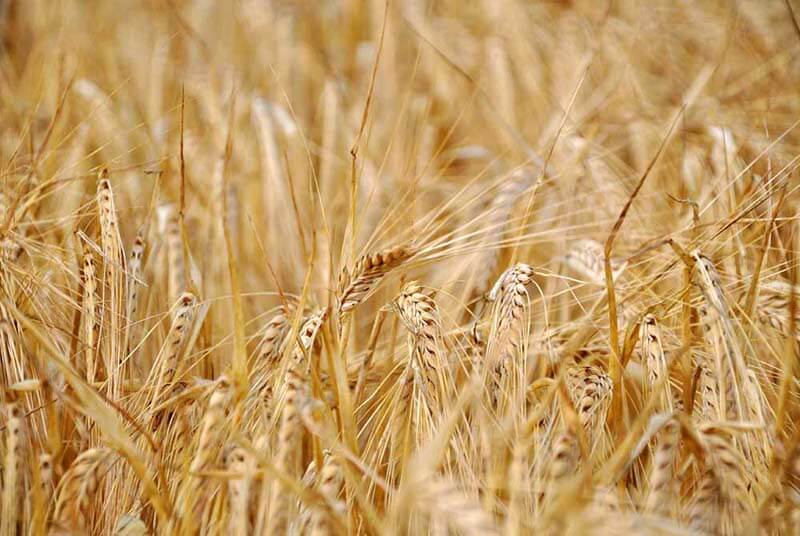The Comprehensive Guide to North American Grain Varieties

September 21, 2022
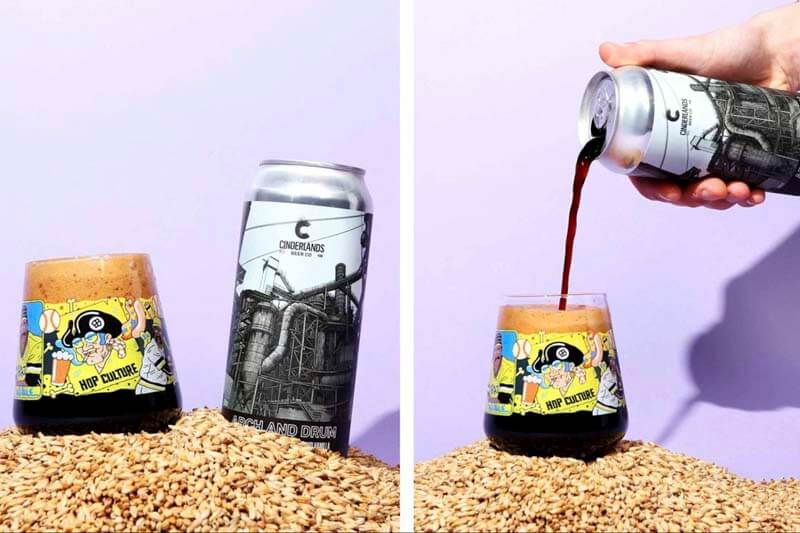
Although hops are probably the hottest ingredient in craft brewing right now, grains are just as important. The base of your beer, malted barley (and other grains) contributes to your beer’s sugar content, color, flavor, and aroma. All crucial building blocks to the entire foundation of your recipe.
Last year, Brewer Association Chief Economist Bart Watson reported that, based on data from a 2021 Brewery Raw Material Use Survey, breweries used about 70lbs/bbl of fermentables, and of those, ninety percent were malted barley.
Barley is a huge component of any beer recipe. Basically, when it boils down to it, without barley we can’t have beer. With that in mind, it's vital to learn about the different types of barley and grain available to you along with each of their important characteristics.
With so many varieties on the market (and new ones seemingly popping up every year), we’re putting together a comprehensive guide to North American, European, and even South American varieties to make sure that as a brewer or brewery owner you’re armed with the best possible knowledge to make a decision around the type of grain to use for your beers.
Editor's Note: For this piece, we’ll cover grains native to North America, but check out our guide on Eurepoean grains to learn more about other varieties around the world.
What We’ll Cover in This Piece:
- What’s Hot in North American Grains Right Now
- What Are the Top Four Grains of 2022, According to the Data?
- A Complete Guide to All North American Grain Varieties
- Standard Processed Malts or Base Malts
- Pilsner Malt
- Pale Malt
- Pale Ale Malt
- Melanoidin Malts (aka Vienna or Munich Malts)
- Caramel Malts
- Caramel/Crystal Malts
- Special Hybrid Malts
- Roasted Malts
- Biscuit Malt
- Amber Malt
- Brown Malt
- Chocolate Malt
- Black Malt
- Other Types of Roasted Malts
- Roasted Barley
- Special Process/Specialty Malts
- Acidulated Malt
- Dextrin-Style
- Smoked Malt
- Non-Barley Malts
- Wheat Malt
- Rye Malt
- Oat Malt
- Organic Malts
- Looking for More Guides on Malts Around the World?
What’s Hot in North American Grains Right Now
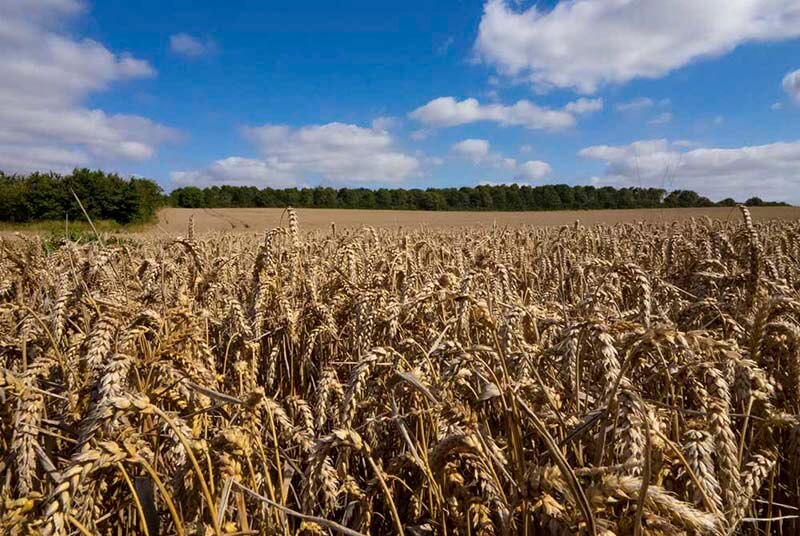
In 2021, craft breweries used an incredible 1.95B lbs of barley, which comes out to 9.1% of the entire North American crop, according to the Brewers Association.
“We know that our industry feeds into a much larger industry,” said Ashley McFarland, Vice President & Technical Director of the American Malting Barley Association, during the BA Collab Hour “What’s Happening with (Brewer Use) of Barley and Hops?” “When you look at all beer beyond just craft, that beer industry is valued at $331 billion a year. But without barley there is no beer so we try to stress how having a stable supply here in the U.S. is so very important.”
But the past year has proved to be pretty challenging for the barley crop in North America for several reasons:
Heat Hurts

Extreme drought conditions mainly on the West Coast have threatened the stability of barley. In fact, the answer to the question What’s hot in North American grains right now? might be just that: heat.
As of April 5, 2022, according to the United States Department of Agriculture (USDA), approximately seventy-three percent of barley production is within an area experiencing drought. And McFarland said that barley production fell thirty percent last year due directly to those drought conditions.
When It Rains It Pours
Conversely, on the other side of the country, a deluge of rain presented its own unique challenges to East Coast growers in 2022, causing some malts to germinate early and affecting the overall quality of the crop.
Seeking the Maltster Down the Street
Both of the climate issues above, along with inflation in the American economy, led to an increase in malt prices. Additionally, supply chain issues caused by the pandemic have continued to disrupt the craft beer commodities market, driving up prices and increasing lead times.
As a result, many breweries have turned to local maltsters as a reliable, trusted source of high-quality malt that doesn’t need to travel far to make it to the brewery.
With climate calamities and the effects of the pandemic still rippling across the industry, we expect more brewers to turn to craft maltsters in 2023.
What Are the Top Four Grains of 2022, According to the Data?
In the BA’s presentation “What’s Happening with (Brewer Use) of Barley and Hops?” Watson reported that the most popular varieties of grain broke down as follows:
- Base Barley = 78.3%
- Speciality Barley Malt = 12%
- Wheat Malt = 6.6%
- Other Fermentables (fruit, honey, sugar, and other grains that weren’t barley or malt) = 3.2%
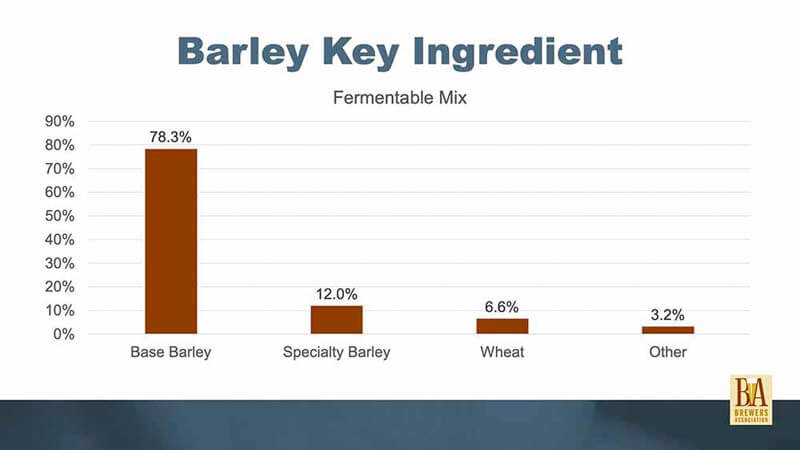
Similarly, brewery management software company Ekos reported from their own real-time data that their 2,000 customers in 2021 used 115M lbs of barley (97M lbs of which was Two-row).
The top five grains used by their brewery customers were as follows:
- Barley = 115M lbs
- Wheat = 24M lbs
- Oats = 11.9M lbs
- Crystal/Caramel Malt = 3.6M lbs
- Rice = 2.2M lbs

But we’ve only just scratched the surface here. Quite simply: A ton of different grains exist in America.
As a brewer or brewery owner, it’s important to not only understand what grains are popular, but also the specs behind these varieties.
For that reason, we’ve put together a handy cheat sheet.
A Complete Guide to All North American Grain Varieties
After looking at the most-trending grains in America, we’ve put together a comprehensive list of the different types of grains along with some essential information to know about each, including: description, type, and color range, and examples of American varieties available from major malt companies.
Editor’s Note: Consider this a cheat sheet. We’re not brewers, so we can’t proclaim this is the most exhaustive guide. For that reason, we’ve sourced all of the information below from a few very reputable vendors and merchants.* All descriptions, types, color ranges, flavor notes, and descriptions come from BSG, Briess, Gambrinus, Great Western Malting, and Rahr Malting Co.
* To get the best and most up-to-date information on any grain variety, be sure to ask your own vendors or merchants.
Standard Processed Malts or Base Malts
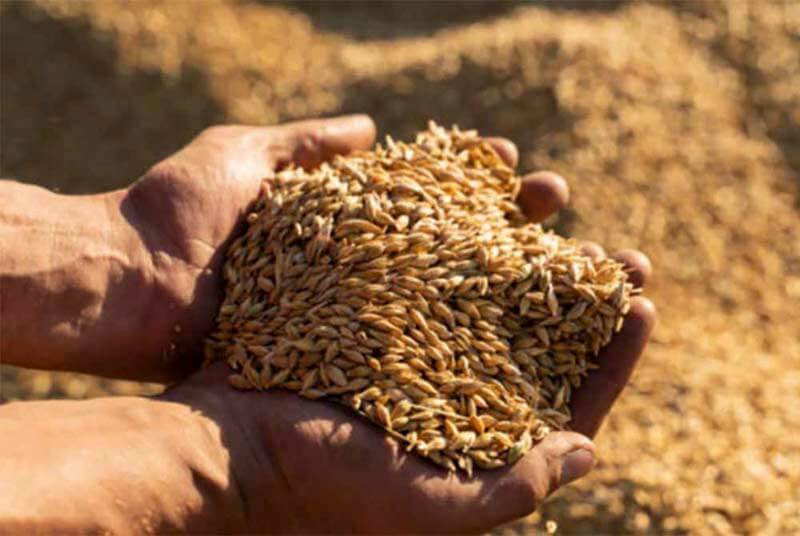
These are your workhorse malts. Built to convert their own starches, base malts have so many different applications from ales to lagers. Below you’ll find the basic base malts and a few examples under each category.
Pilsner Malt
Pilsen Malt
Description: Exceptionally light-colored base malt that produces a very light-colored, clean, crisp wort and allows the full flavor of specialty malts to shine through. It can be used as a base malt for all beer styles and is an excellent choice for lagers. (Briess)
Origin: United States
Manufacturer: Briess
Type: Base
Color Range (SRM): 1.2
Flavor Notes: Clean, sweet, delicate malty
Beer Styles: Any beer style needing delicate, malt flavor
Pilsner Malt
Description: Processed from the finest Canadian two-row available, this very low-protein base malt is versatile in a wide range of beer styles. (BSG)
Origin: Canada
Manufacturer: Gambrinus
Type: Base
Color Range (SRM): 1.3-1.8
Flavor Notes: Expect delicate flavors of fresh barley, grain, honey, and bread, along with distinctive nutty character and vanilla
Beer Styles: Pilsner, kölsch, pale lager, Belgian ale, session IPA, and blonde ale; or as a portion of the grist for hefeweizen or witbierPure Idaho Pilsner Malt
Description: Between the rugged Sawtooth Mountains and craggy Grand Tetons lie golden fields of barley perfection. It’s here, to the West of the Great Divide, where Great Western Malting crafts their renowned Pure Idaho malt. (Great Western Malting)
Origin: United States
Manufacturer: Great Western Malting
Type: Base
Color Range (SRM): 1.6
Flavor Notes: Crisp, delicate, clean, smooth
Beer Styles: All-purpose malt for any style of beer or spiritsRahr Old World Pilsner
Description: Rahr Old World Pilsner is special because it doesn’t germinate as quickly as other domestic two-rows, which means that more of the insoluble protein is left in the kernel. In this, the malt is giving up some extract but delivers greater flavor, yeast nutrients, and some beer foam stability in return. Also, this malt is lower in DP, which means that when step-mashing some starch will convert in the higher temperature range. (BSG)
Origin: United States
Manufacturer: Rahr
Type: Base
Color Range (SRM): 1.5-2
Flavor Notes: Light, neutral
Beer Styles: Pilsners, clean lagersRahr Premium Pilsner
Description: Rahr Premium Pilsner is a lager-style base malt made from premium North American two-row barley. Its light color, neutral flavor, and low protein content make Premium Pilsner an excellent choice for brewing clear, clean-tasting lagers. (Rahr)
Origin: United States
Manufacturer: Rahr
Type: Base
Color Range (SRM): 1.5-2
Flavor Notes: Light, neutral
Beer Styles: Clear, clean-tasting lagersSuperior Pilsen
Description: As crisp and clean as fresh mountain air, this two-row pilsner malt is simply superior. It’s perfect for brewing the malty, light-colored lagers and ales we all crave after a hearty day in the great outdoors. (Great Western Malting)
Origin: United States
Manufacturer: Great Western Malting
Type: Base
Color Range (SRM): 1.6
Flavor Notes: Crisp, delicate, smooth, clean
Beer Styles: All-purpose malt for any style of beerSynergy Select Pilsen Malt
Description: Premium, European-style Pilsen craft malt for all beer styles. It has a high extract, moderate enzymes, and FAN for controllable, consistent processing. (Briess)
Origin: United States
Manufacturer: Briess
Type: Base
Color Range (SRM): 1.8
Flavor Notes: Clean, sweet, mild malty
Beer Styles: Any beer style needing subtle, round base malt flavorSynergy Select Pilsen Maltgems®
Description: Custom milled in small batches to reduce bitter, astringent flavors. MaltGems® is crafted by removing the majority of husk, fine grit, and flour from milled Synergy Select Pilsen Malt. What remains is the heart of the malt, that can be lautered like a traditional brewer’s grind to deliver exceptional performance. This innovative product reveals true malt flavors with a remarkably clean finish. (Briess)
Origin: United States
Manufacturer: Briess
Type: Base
Color Range (SRM): 1.8
Flavor Notes: Clean, sweet, with notes of bread, cracker, and honey
Beer Styles: Any beer style where clean, sweet, well-rounded base malt flavor is desiredPale Malt
Briess Brewers Malt
Description: Clean, sweet, mild, malty. A great base malt for all beer styles. It is produced exclusively from high-quality two-row North American malting barley grown in premium U.S. barley growing regions. (Briess)
Origin: United States
Manufacturer: Briess
Type: Base
Color Range (SRM): 1.8
Flavor Notes: Clean, sweet, mild malty
Beer Styles: Any beerPale Malt
Description: A plump two-row European-style pale ale malt is a base for all beer styles and is processed from premium Canadian two-row barley. (BSG)
Origin: Canada
Manufacturer: Gambrinus
Type: Base
Color Range (SRM): 1.5-2
Flavor Notes: Fresh barley and bready character with background notes of biscuit, grain, honey, and hints of nutty and green tea flavor
Beer Styles: Use for styles where a rich malt flavor can be shown off, or where a strong malt backbone is needed to balance other strong flavors—IPA, pale ale, brown ale, golden ale, or Scottish and Belgian alesPremium Two Row Malt
Description: Classic. Premium. Perfection. For generations, Premium Two Row has been Great Western Malting’s pinnacle base malt. It’s perfect for all beer styles, especially American ales and lagers, producing a very clean, smooth finish. When you want peak performance, there’s no better choice than Premium Two Row. (Great Western Malting)
Origin: United States
Manufacturer: Great Western Malting
Type: Base
Color Range (SRM): 2
Flavor Notes: Sweet, clean, smooth
Beer Styles: All-purpose malt for all styles of beerPure California Malt
Description: At the base of Mount Shasta, one of the state’s most loved destinations, flow hearty fields of barley that we transform into Pure California malt. (Great Western Malting)
Origin: United States
Manufacturer: Great Western Malting
Type: Base
Color Range (SRM): 2
Flavor Notes: Sweet, clean, smooth
Beer Styles: All-purpose malt for any style of beer or spiritsPure Oregon Malt
Description: From the center of the craft brewing revolution comes the malt at the heart of it all: Pure Oregon. Crafted from 100% Oregon barley, it’s what makes a true Oregon brew. (Great Western Malting)
Origin: United States
Manufacturer: Great Western Malting
Type: Base
Color Range (SRM): 2
Flavor Notes: Sweet, clean, smooth
Beer Styles: All-purpose malt for any style of beer or spiritsPure Washington Malt
Description: In the sunset shadow of the Cascade Range grows some of the finest barley in North America. Welcome to the Palouse: God’s country, where deep, rich soil and a perfect climate converge to create the Pure Washington malt you love. (Great Western Malting)
Origin: United States
Manufacturer: Great Western Malting
Type: Base
Color Range (SRM): 2
Flavor Notes: Sweet, clean, smooth
Beer Styles: All-purpose malt for any style of beerRahr Standard 2-Row
Description: Rahr Standard 2-Row is a light-colored base malt made from a blend of North American two-row barley varieties. It is darker than most lager malts but lighter than most pale ale malts. It has moderate protein levels and good extract yield. Its neutral characteristics make it extremely versatile, and it is widely used by North American craft breweries as their standard base malt for any beer style. (Rahr)
Origin: United States
Manufacturer: Rahr
Type: Base
Color Range (SRM): 1.7-2
Flavor Notes: Neutral
Beer Styles: Any beer style
Rahr Standard 6-Row
Description: Rahr Standard 6-Row is a light-colored base malt made from a blend of North American six-row barley varieties. Six-row barley has a much higher protein content and enzymatic power than two-row barley. Inclusion of Standard 6-Row is therefore very advantageous for recipes calling for large proportions of specialty malts, wheat malts, or adjuncts, which have little or no enzymatic power themselves. Six-row barley is also used to match historical beer styles from settings where two-row barley was not widely available. High proportions of six-row barley may necessitate the use of adjuncts or require protein rests in mashing. (Rahr)
Origin: United States
Manufacturer: Rahr
Type: Base
Color Range (SRM): 2.1-2.5
Flavor Notes: Neutral
Beer Styles: Any beer stylePale Ale Malt
Pale Ale Malt
Description: A fully modified, high-extract, low protein malt, not just a darker Brewers Malt. The proprietary malting process involves careful monitoring of the kiln drying process and specialized temperature rests that result in the development of its unique flavor. (Briess)
Origin: United States
Manufacturer: Briess
Type: Base
Color Range (SRM): 3.5
Flavor Notes: Rich, malty; hints of biscuit and notes
Beer Styles: Ales (except kölsch); rich, full-flavored dark beersAshburne® Mild Malt
Description: A slightly darker malt with a higher dextrin level than Pale Ale Malt. It lends a higher residual maltiness/mouthfeel. (Briess)
Origin: United States
Manufacturer: Briess
Type: Base
Color Range (SRM): 5.3
Flavor Notes: Slightly malty and sweet with a subtle toasty note
Beer Styles: Any style needing enhanced malty flavor and aroma; Bock, doppelbock, mild ale, brown ale, Belgian ale, and barleywine
ESB Pale Malt
Description: Gambrinus Extra Special British Pale Malt is malted for brewers seeking the unique flavor imparted by British Pale Malt. Gambrinus has modified its malting process to give you a distinctive malt traditionally found only on the British Isles. As you’d expect from the name, ESB Pale Malt is ideal for authentic English-style bitter, pale ale, and IPA. (BSG)
Origin: Canada
Manufacturer: Gambrinus
Type: Base
Color Range (SRM): 3-4
Flavor Notes: Robust brea, cereal, caramel, grain, honey, and nutty
Beer Styles: Scottish ales, imperial IPA, American strong ale, old ale, or barleywinePale High Color Malt
Description: Step right up to the bold, rich, malty character of Pale High Color. A better backbone for bigger beers, it balances bitterness and hop-forward profiles. (Great Western Malting)
Origin: United States
Manufacturer: Great Western Malting
Type: Base
Color Range (SRM): 3
Flavor Notes: Robust, malty, rich, clean
Beer Styles: Ales, robust dark beers, and British beer stylesRahr Pale Ale
Description: Rahr Pale Ale is an ale-style base malt made from a blend of North American two-row barleys. It has an excellent color, slightly darker than Rahr Standard or Pilsner malts, good malt flavor, and high-extract yield. (Rahr)
Origin: United States
Manufacturer: Rahr
Type: Base
Color Range (SRM): 3-4
Flavor Notes: Good malt flavor
Beer Styles: American ales, English ales, almost any style of beerMelanoidin Malts (aka Vienna or Munich Malts)
The name of this malt category is pretty self-explanatory. Malts in this category have a higher melanoidin content. These malts work great as a base for amber lagers or those with a sweeter, more caramel complexity.
Vienna malts tend to be lighter than Munich ones, which are darker, more roasted and perfect for beers like Oktoberfest or märzen.
American Honey Malt
Description: This is a traditional melanoidin style malt with a complex flavor. This custom‐crafted malt lends sweet bakery flavors that increase in complexity with higher usage rates. With lower inclusion, you can expect subtle honey and bread flavors. At higher usage, expect complex bakery flavors ranging from honey and graham cracker to biscuit and brown sugar. (Briess)
Origin: United States
Manufacturer: Briess
Type: Specialty
Color Range (SRM): 25
Flavor Notes: Smooth, clean, honey, sweet bread, biscuit
Beer Styles: It can be used in a wide variety of beer styles from light lagers & ales to malt-forward beers like dark lagers and red and Scottish alesAromatic Munich Malt 20L
Description: This is a European-style dark Munich Malt with clean, intensely malty flavor. It works great for any beer needing a maltier flavor or aroma. (Briess)
Origin: United States
Manufacturer: Briess
Type: Color
Color Range (SRM): 20
Flavor Notes: Very smooth, clean, slightly sweet, rich intense malty
Beer Styles: Bock/doppelbock or any style needing an enhanced malty flavor and aromaBonlander® Munich Malt 10L
Description: This is a European-style Munich Malt with a clean, malty flavor. It works great for any beer that benefits from enhanced malty flavor. (Briess)
Origin: United States
Manufacturer: Briess
Type: Color
Color Range (SRM): 10
Flavor Notes: Clean, slightly sweet, rich malty
Beer Styles: Bock-style beers or any beer that benefits from enhanced malty flavorDark Munich Malt 30L
Description: This is a European-style Munich Malt hybrid with a clean, big malty flavor with slight toasty notes. It works great for any beer that benefits from enhanced malty flavor. (Briess)
Origin: United States
Manufacturer: Briess
Type: Color
Color Range (SRM): 30
Flavor Notes: Clean, slightly sweet, big rich malty, slightly toasty
Beer Styles: Dunkel lager, IPA, red ale, bock, pale ale, dunkelweizenDark Munich
Description: Dark Munich is a highly kilned version of Great Western Malting’s traditional Munich malt. It contributes a deep malt-forward flavor and delicate roasted characteristics. Hints of chocolate are balanced alongside subtle sweetness, toastiness, and biscuit notes. (Great Western Malting)
Origin: United States
Manufacturer: Great Western Malting
Type: Color
Color Range (SRM): 20
Flavor Notes: Intensely malty, subtly sweet, toasted biscuit
Beer Styles: Dunkel lager, IPA, red ale, bock, pale ale, dunkelweizen
Goldpils® Vienna
Description: This is a superb example of a classic Vienna malt. It finishes exceptionally clean and contributes light golden hues and is less modified than Pale Ale Malt and less intensely kilned than Munich malts. It has a sufficient enzyme level to support the inclusion of even the most demanding specialty malts without extending the brewing cycle. (Briess)
Origin: United States
Manufacturer: Briess
Type: Base
Color Range (SRM): 3.5
Flavor Notes: Rich malty, hints of biscuity notes, finishes exceptionally clean
Beer Styles: Vienna and Oktoberfest/märzen, ales, rich, full-flavored dark beersLight Munich
Description: A dash of malt sweetness, a hint of gold, and a heaping spoonful of soul. Bring the essence of Oktoberfest to any occasion. Prost! (Great Western Malting)
Origin: United States
Manufacturer: Great Western Malting
Type: Color
Color Range (SRM): 6
Flavor Notes: Malty sweetness, bready, mild biscuit
Beer Styles: IPA, pale ale, session ale, Oktoberfest, lagerMela Malt
Description: Rich, full, and mellow. Mela malt provides a toasted biscuit flavor and a mouthfeel worthy of contemplation around a campfire. (Great Western Malting)
Origin: United States
Manufacturer: Great Western Malting
Type: Color
Color Range (SRM): 22.7
Flavor Notes: Malty, slightly sweet, and toasted biscuit
Beer Styles: Dunkel lager, red ale, IPA, scotch ale, doppelbock, and dubbelMunich Dark 30L
Description: A very deeply kilned Munich malt that combines the color and flavor characteristics of roasted malt with the mellowness of Munich malt. (BSG)
Origin: Canada
Manufacturer: Gambrinus
Type: Color
Color Range (SRM): 25-30
Flavor Notes: Bread crust, toffee, brown sugar, caramel, cereal, and toast
Beer Styles: Altbier, doppelbock, dark Belgian beers, brown ale, red ale, dark lagersMunich Light 10L
Description: Seeking a well-balanced malty beer? This plump, sweet, and mellow Munich malt delivers impressions of toast, pretzel, toffee, and caramel, with nutty and cereal grain background notes. (BSG)
Origin: Canada
Manufacturer: Gambrinus
Type: Color
Color Range (SRM): 9.5-10.5
Flavor Notes: Toast, pretzel, toffee, caramel, nutty, cereal grain
Beer Styles: Ideal as the base malt for amber or red ales, Altbier, Scottish ales, and traditional Bavarian lagers; we also recommend small inclusions for pale ale, IPA, and other styles to intensify color and boost the perception of maltiness without the sweetness of caramel maltMunich Malt
Description: Tradition. That’s what Munich Malt is all about: Northwest-grown IPAs and Oktoberfest-inspired brews and bocks. Great Western Malting Munich Malt gives bold malt flavor and aroma. Ideal for any Biergarten. (Great Western Malting)
Origin: United States
Manufacturer: Great Western Malting
Type: Color
Color Range (SRM): 7.9
Flavor Notes: Intensely malty, moderately sweet, slightly nutty
Beer Styles: IPA, pale ale, Oktoberfest, märzen, and dark lagersVienna Malt
Description: Vienna Malt is created with attention to flavor development and malt complexity. Great for brewing full-bodied beers with rich malt and light biscuit characteristics. (Great Western Malting)
Origin: United States
Manufacturer: Great Western Malting
Type: Base
Color Range (SRM): 4
Flavor Notes: Sweet, malty, mild biscuit, bready
Beer Styles: Pale ale, IPA, amber ale, Vienna, Oktoberfest, märzenVienna Malt
Description: This mellow kilned malt is the missing link between a Pale and Munich malt. It is ideal for any amber beer, adding a balanced malty character with strong suggestions of honey, toffee, and caramel. (BSG)
Origin: Canada
Manufacturer: Gambrinus
Type: Base
Color Range (SRM): 5-6
Flavor Notes: Honey, toffee, caramel
Beer Styles: Use at up to 100% for traditional Vienna, Märzen, and other amber beer styles, or as a smaller fraction of the grist to add cereal, biscuit, and toasty notes to pale ale or IPA, Kölsch and blonde ales, or Belgian stylesCaramel Malts
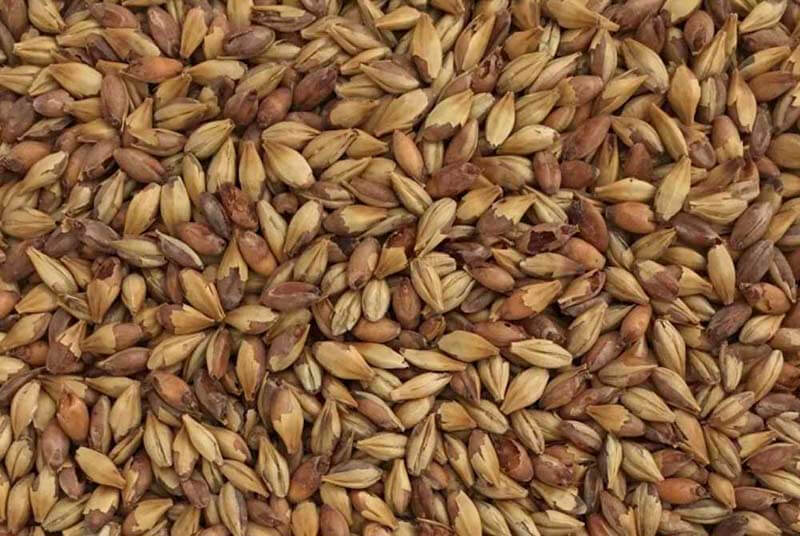
Whereas other malts are kilned, caramel malts roast the germinated grain (green malt) in a drum roaster, producing a malt that gives off a deeper gold color and candy-like sweetness.
Caramel/Crystal Malts
Caramel Malt - 10L
Description: This is a drum-roasted crystallized malt that improves foam, enhances viscosity, and contributes golden hues with a candy-like sweetness. Briess Caramel Malts are roaster produced, making them the fullest-flavored and best-performing Caramel Malts. (Briess)
Origin: United States
Manufacturer: Briess
Type: Crystal
Color Range (SRM): 10
Flavor Notes: Candy-like sweetness, mild caramel
Beer Styles: For balance in pilsners; lagers ranging from California common, Vienna, and bock, to dark lagers; and variety of ales including pale ales and bitter IPAs through dark ales like porters and stoutsCaramel Malt - 20L
Description: This is a drum-roasted crystallized malt that improves foam, enhances viscosity, and contributes golden hues with a candy-like sweetness. Briess Caramel Malts are roaster produced, making them the fullest-flavored and best-performing Caramel Malts. (Briess)
Origin: United States
Manufacturer: Briess
Type: Crystal
Color Range (SRM): 20
Flavor Notes: Candy-like sweetness, mild caramel
Beer Styles: For balance in pilsners; lagers running from California common, Vienna, and bock to dark lagers; and variety of ales including pale ales, bitter IPAs, porters, stoutsCaramel Malt - 30L
Description: This is a drum-roasted crystallized malt that improves foam, enhances viscosity, and contributes golden hues with a candy-like sweetness. Briess Caramel Malts are roaster produced, making them the fullest-flavored and best-performing Caramel Malts. (Briess)
Origin: United States
Manufacturer: Briess
Type: Crystal
Color Range (SRM): 30
Flavor Notes: Sweet, caramel, toffee
Beer Styles: For balance in pilsners; lagers running from California common, Vienna, and bock to dark lagers; and variety of ales including pale ales, bitter IPAs, porters, stoutsCaramel Malt - 40L
Description: This is a drum-roasted crystallized malt that improves foam, enhances viscosity, and contributes golden hues with a candy-like sweetness. Briess Caramel Malts are roaster produced, making them the fullest-flavored and best-performing Caramel Malts. (Briess)
Origin: United States
Manufacturer: Briess
Type: Crystal
Color Range (SRM): 40
Flavor Notes: Sweet, caramel, toffee
Beer Styles: For balance in pilsners; lagers running from California common, Vienna, and bock to dark lagers; and variety of ales including pale ales, bitter IPAs, porters, stoutsCaramel Malt - 60L
Description: This is a drum-roasted crystallized malt that improves foam, enhances viscosity, and contributes golden hues with a candy-like sweetness. Briess Caramel Malts are roaster produced, making them the fullest-flavored and best-performing Caramel Malts. (Briess)
Origin: United States
Manufacturer: Briess
Type: Crystal
Color Range (SRM): 60
Flavor Notes: Sweet, pronounced caramel
Beer Styles: For balance in pilsners; in lagers ranging from Vienna and Oktoberfest to dark lagers; in variety of ales including pale ales, bitter IPAs, porter, stout, and barleywine; and in various styles including doppelbocksCaramel Malt - 80L
Description: This is a drum-roasted crystallized malt that improves foam, enhances viscosity, and contributes golden hues with a dried fruit, candy-like sweetness. Briess Caramel Malts are roaster produced, making them the fullest-flavored and best performing Caramel Malts. (Briess)
Origin: United States
Manufacturer: Briess
Type: Crystal
Color Range (SRM): 80
Flavor Notes: Pronounced caramel, slight burnt sugar, raisiny
Beer Styles: For balance in pilsners; in lagers ranging from Vienna and Oktoberfest to dark lagers; in variety of ales including pale ales, bitter IPAs, porter, stout, and barleywine; and in various styles including doppelbocksCaramel Malt - 90L
Description: This is a drum-roasted crystallized malt that improves foam, enhances viscosity, and contributes golden hues with a dried fruit, candy-like sweetness. Briess Caramel Malts are roaster produced, making them the fullest-flavored and best performing Caramel Malts. (Briess)
Origin: United States
Manufacturer: Briess
Type: Crystal
Color Range (SRM): 90
Flavor Notes: Pronounced caramel, burnt sugar, raisiny, prunes
Beer Styles: For balance in pilsners; in lagers ranging from Vienna and Oktoberfest to dark lagers; in variety of ales including pale ales, bitter IPAs, porter, stout, and barleywine; and in various styles including doppelbocksCaramel Malt - 120L
Description: This is a drum-roasted crystallized malt that improves foam, enhances viscosity, and contributes golden hues with a dried fruit, candy-like sweetness. Briess Caramel Malts are roaster produced, making them the fullest-flavored and best-performing Caramel Malts. (Briess)
Origin: United States
Manufacturer: Briess
Type: Crystal
Color Range (SRM): 120
Flavor Notes: Pronounced caramel, burnt sugar, raisiny, prunes
Beer Styles: For balance in pilsners; in lagers ranging from vienna and Oktoberfest to dark lagers; and variety of ales includeing pale ales, bitter IPAs, porters, stouts, and barleywinesCaramel Munich Malt - 60L
Description: This malt has flavors reminiscent of traditional kiln-made caramels. It has a unique combination of bready, toasty, and biscuit flavors mixed with sweet caramel notes. It is frequently used in IPA, pale ale, Oktoberfest, and porters. (Briess)
Origin: United States
Manufacturer: Briess
Type: Crystal
Color Range (SRM): 60
Flavor Notes: Caramel, roasted, malty
Beer Styles: Excellent for added complexity in IPA, amber, ESB, and any other dark beer stylesCaramel Rye Malt
Description: This is a drum-roasted crystallized rye malt that improves foam, enhances viscosity, and contributes golden hues with a candy-like sweetness and the spicy character of rye. You can use this with Briess Rye Malt or Briess Brewers Rye Flakes for more rye flavor and to complement the smooth and subtle, yet complex, flavor of Briess Caramel Rye Malt and add depth and subtle flavor to many styles of beer. (Briess)
Origin: United States
Manufacturer: Briess
Type: Crystal
Color Range (SRM): 60
Flavor Notes: Touches of caramel and bread crust flavors that complement the spicy character of rye
Beer Styles: Adds depth to lighter-flavor beers like pilsner, Oktoberfest, and bock; adds complexity to malt-forward beers; adds intriguing softness and rye-like character; use in all rye-style beers for toast flavor and color as well as in Scottish ales, doppelbock, dunkel, stout, porter, and other medium-to-dark ales and lagersCaramel Steam Malt
Description: The innovative process Great Western Malting uses to create Caramel Steam turns Northwest barley into a mighty malt. Caramel Steam creates a delicate sweetness with reduced astringency allowing other flavors to shine through. (Great Western Malting)
Origin: United States
Manufacturer: Great Western Malting
Type: Crystal
Color Range (SRM): 40
Flavor Notes: Malty, graham cracker, caramel, and slightly nutty
Beer Styles: IPA, Irish red, English bitter, porter, barleywine, and lagerCaramel Vienne Malt - 20L
Description: This malt adds flavors unique to Vienna-style lagers and Belgian-style abbey ales. It has flavors reminiscent of traditional kiln-made caramels with subtle notes of sweet caramel and toffee complemented by sweet malty and bready notes. (Briess)
Origin: United States
Manufacturer: Briess
Type: Crystal
Color Range (SRM): 20
Flavor Notes: Soft toffee, caramel, malty
Beer Styles: Frequently used in Vienna-style lagers and Belgian-style abbey alesCrystal 15
Description: Mastery. It’s what brewers and distillers strive for and why they have relied on Great Western Malting since the day Prohibition ended. Today, you’ll find Great Western Malting crystal malts at the heart of award-winning beer and spirits throughout North America. (Great Western Malting)
Origin: United States
Manufacturer: Great Western Malting
Type: Crystal
Color Range (SRM): 15
Flavor Notes: Light caramel with a bright sweetness and delicate malty flavor
Beer Styles: IPA, pale ale, blonde ale, English bitter, mild ale, Vienna, märzen, OktoberfestCrystal 30
Description: Mastery. It’s what brewers and distillers strive for and why they have relied on Great Western Malting since the day Prohibition ended. Today, you’ll find Great Western Malting crystal malts at the heart of award-winning beer and spirits throughout North America. (Great Western Malting)
Origin: United States
Manufacturer: Great Western Malting
Type: Crystal
Color Range (SRM): 30
Flavor Notes: Mellow sweetness, rich caramel, and malty flavor
Beer Styles: IPA, pale ale, amber lager, English bitter, mild ale, Vienna, märzen, OktoberfestCrystal 40
Description: Mastery. It’s what brewers and distillers strive for and why they have relied on Great Western Malting since the day Prohibition ended. Today, you’ll find Great Western Malting crystal malts at the heart of award-winning beer and spirits throughout North America. (Great Western Malting)
Origin: United States
Manufacturer: Great Western Malting
Type: Crystal
Color Range (SRM): 40
Flavor Notes: Malty with robust caramel and soft sweetness
Beer Styles: Pale ale, amber lager, red ale, IPA, Oktoberfest, bock, Vienna, märzen, Belgian ale, porter, and dark lagersCrystal 60
Description: Mastery. It’s what brewers and distillers strive for and why they have relied on Great Western Malting since the day Prohibition ended. Today, you’ll find Great Western Malting crystal malts at the heart of award-winning beer and spirits throughout North America. (Great Western Malting)
Origin: United States
Manufacturer: Great Western Malting
Type: Crystal
Color Range (SRM): 60
Flavor Notes: Mildly sweet with pronounced toasty caramel and dried fruit flavors
Beer Styles: Amber ale, red lager, pale ale, IPA, brown ale, porter, stout, dark lager, and Belgian aleCrystal 75
Description: Mastery. It’s what brewers and distillers strive for and why they have relied on Great Western Malting since the day Prohibition ended. Today, you’ll find Great Western Malting crystal malts at the heart of award-winning beer and spirits throughout North America. (Great Western Malting)
Origin: United States
Manufacturer: Great Western Malting
Type: Crystal
Color Range (SRM): 75
Flavor Notes: Complex caramel and dark toffee flavors with a lingering sweetness
Beer Styles: Porter, stout, bock, abbey ale, Belgian ale, red ale, barleywine, wee heavy, and dark lagers
Crystal 120
Description: Mastery. It’s what brewers and distillers strive for and why they have relied on Great Western Malting since the day Prohibition ended. Today, you’ll find Great Western Malting crystal malts at the heart of award-winning beer and spirits throughout North America. (Great Western Malting)
Origin: United States
Manufacturer: Great Western Malting
Type: Crystal
Color Range (SRM): 120
Flavor Notes: Intensely toasty, toffee, raisin, dried plums
Beer Styles: Stout, porter, doppelbock, abbey ale, Belgian ale, red ale, barleywine, wee heavy, dark lagersCrystal 150
Description: Mastery. It’s what brewers and distillers strive for and why they have relied on Great Western Malting since the day Prohibition ended. Today, you’ll find Great Western Malting crystal malts at the heart of award-winning beer and spirits throughout North America. (Great Western Malting)
Origin: United States
Manufacturer: Great Western Malting
Type: Crystal
Color Range (SRM): 150
Flavor Notes: Intensely roasted, dark chocolate, coffee, and dark fruit
Beer Styles: Stout, porter, doppelbock, dubbel, barleywine, wee heavy, and dark lagersRahr Kilned Caramel 30
Description: Rahr Kilned Caramel malts give your beer color, aroma, flavor, and body, but without the prominent sweetness of drum-roasted caramel malts. The Kilned Caramel 30 adds rich golden-red color and notes of bread, honey, and caramel. (Rahr)
Origin: United States
Manufacturer: Rahr
Type: Crystal
Color Range (SRM): 25-35
Flavor Notes: Bread, honey, caramel
Beer Styles: For balance in pilsners; lagers running from California common, Vienna, and bock to dark lagers; and variety of ales including pale ales, bitter IPAs, porters, stoutsRahr Kilned Caramel 47
Description: Rahr Kilned Caramel malts give your beer color, aroma, flavor, and body, but without the prominent sweetness of drum-roasted caramel malts. The Kilned Caramel 47 is named in honor of 1847, the year William Rahr founded the company. It imparts bronze-red color and nutty, grainy, and mild caramel notes. (Rahr)
Origin: United States
Manufacturer: Rahr
Type: Crystal
Color Range (SRM): 40-50
Flavor Notes: Nutty, caramel, bread crust, grain
Beer Styles: For balance in pilsners; lagers running from California common, Vienna, and bock to dark lagers; and a variety of ales including pale ales, bitter IPAs, porters, stoutsRahr Kilned Caramel 80
Description: Rahr Kilned Caramel malts give your beer color, aroma, flavor, and body, but without the prominent sweetness of drum-roasted caramel malts. The Kilned Caramel 80 brings deep red-amber color along with nutty, caramel, bread crust, and grainy character. (Rahr)
Origin: United States
Manufacturer: Rahr
Type: Crystal
Color Range (SRM): 70-80
Flavor Notes: Nutty, caramel, bread crust, grain
Beer Styles: For balance in pilsners; in lagers ranging from Vienna and Oktoberfest to dark lagers; in variety of ales including pale ales, bitter IPAs, porter, stout, and barleywine; and in various styles including doppelbocksSpecial Hybrid Malts
Extra Special Malt
Description: This is a hybrid drum-roasted malt that is made using a proprietary drum-roasting process that develops both caramel and dry roasted flavors. It provides richer, more complex flavors in lighter-colored and lighter-gravity beers that are often associated with darker, high-gravity beers like doppelbocks. (Briess)
Origin: United States
Manufacturer: Briess
Type: Specialty
Color Range (SRM): 130
Flavor Notes: Toasted marshmallow, toast, mild coffee, prunes, dry, woody
Beer Styles: Belgian ales, English ales, doppelbock, Irish stout, porterRoasted Malts
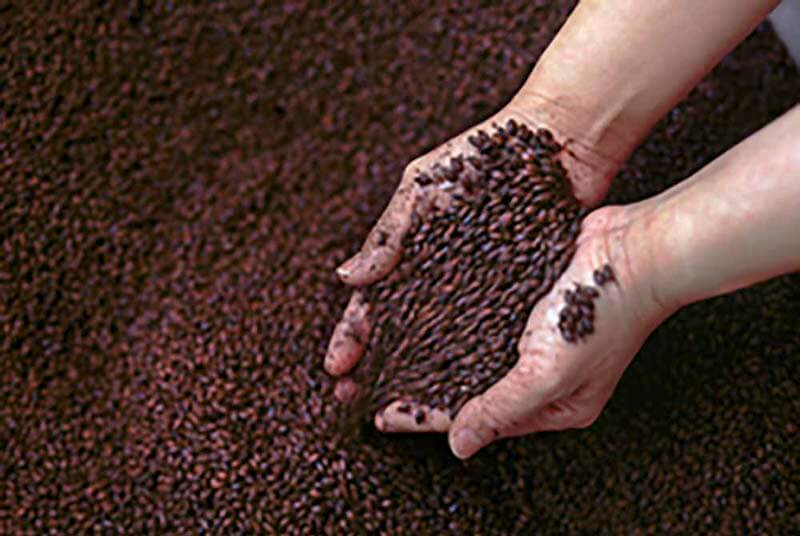
Made through roasting (hence the name) pale malts, this variety produces a grain that imparts drier, more bitter flavors. Although some might also say roasted malts give off a bit of cocoa too.
Biscuit Malt
Special Roast Malt
Description: This is a drum-roasted biscuit-style malt that is more deeply roasted than Briess Victory® Malt. It is produced from a proprietary malting/roasting process that kicks up the intensity of the toasty and biscuity flavors. It develops noticeable bran flake notes and creates its distinguishing bold sourdough/tangy flavor. (Briess)
Origin: United States
Manufacturer: Briess
Type: Roasted Malt
Color Range (SRM): 40
Flavor Notes: Toasty, biscuity, bran flakes, sourdough, tangy
Beer Styles: Excellent in IPA, ESB, amber, nut brown ale, porter, and other dark beer stylesAmber Malt
Brown Malt
Carabrown® Malt
Description: This malt was developed on the light side of the brown malt style in order to retain some residual sweetness while still delivering an assortment of lightly toasted flavors. The overall character is an exceptionally smooth and clean-tasting malt that begins with a slightly sweet malty flavor before delivering its payload of toasted flavors, then finishing clean and somewhat dry. (Briess)
Origin: United States
Manufacturer: Briess
Type: Roasted Malt
Color Range (SRM): 55
Flavor Notes: Smooth, slightly sweet malty, lightly toasted biscuity, nutty, graham cracker, clean dry finish
Beer Styles: Great in bitter, pale, mild, and Belgian ales, wheat beers, bock, Oktoberfest, and Scotch aleVictory® Malt
Description: With an aroma of baking bread, Victory® Malt is well suited for Nut Brown Ales and other medium to dark beers. It has a clean flavor that makes it well suited for ales and lagers. You can use in small amounts to add complexity and warm color to lighter colored ales and lagers. (Briess)
Origin: United States
Manufacturer: Briess
Type: Color
Color Range (SRM): 28
Flavor Notes: Toasty, biscuity, baking bread, nutty, clean
Beer Styles: Excellent in IPA, ESB, amber, nut brown ale, porter, and other dark beer stylesChocolate Malt
Chocolate Malt
Description: The chocolate flavor of this malt is complementary when used in higher percentages. It can be used in all beer styles for color adjustment. (Briess)
Origin: United States
Manufacturer: Briess
Type: Roasted Malt
Color Range (SRM): 350
Flavor Notes: Rich roasted coffee, cocoa
Beer Styles: Porter, stout, brown ale, dunkel, and other dark beersDark Chocolate Malt
Description: The chocolate flavor of this malt is complementary when used in higher percentages. It can be used in all beer styles for color adjustment. (Briess)
Origin: United States
Manufacturer: Briess
Type: Roasted Malt
Color Range (SRM): 430
Flavor Notes: Rich smooth coffee
Beer Styles: Porter, stout, brown ale, dunkel, and other dark beersBlack Malt
Black Malt
Description: This malt is often used to provide color without overpowering flavor that is characteristic of European-style dark beers. It may be used with or without Roasted Barley to brew a stout with more color and less intense Roasted Barley flavor notes, and it may be used with Chocolate Malt to produce a porter with less pronounced chocolate flavor notes. (Briess)
Origin: United States
Manufacturer: Briess
Type: Roasted Malt
Color Range (SRM): 500
Flavor Notes: Dry roasted, sharp to neutral
Beer Styles: All styles for color with little or no flavor; porter and stoutBlack Barley
Description: This malt provides color and rich, sharp flavor which is a characteristic in stouts and some porters. It may be used with Black Malt to brew a stout with more color and less intense Roasted Barley flavor notes. You can use Chocolate Malt or Black Malt in combination with Black Barley to obtain desired color. (Briess)
Origin: United States
Manufacturer: Briess
Type: Specialty
Color Range (SRM): 500
Flavor Notes: Roasted, coffee, burnt
Beer Styles: Porter and stoutBlack Malted Barley Flour
Description: This malted barley flour is often used to provide color without overpowering flavor that is characteristic of European-style dark beers. It produces dark-colored beer with little impact on foam color. Use when dark beer with light head is desired. It may be used with or without Roasted Barley to brew a stout with more color and less intense Roasted Barley flavor notes, and it may be used with Chocolate Malt to produce a porter with less pronounced chocolate flavor notes. (Briess)
Origin: United States
Manufacturer: Briess
Type: Specialty
Color Range (SRM): 500
Flavor Notes: Dry roasted, sharp to neutral
Beer Styles: All styles for color with little or no flavor; porter and stoutBlackprinz® Malt
Description: Produced from hulless barley and functions as a 1:1 replacement to debittered Black Malt, but with smoother flavor. It contributes the same color characteristics as Black Malt but without the bitter, astringent, dry flavors, or aftertaste. (Briess)
Origin: United States
Manufacturer: Briess
Type: Roasted Malt
Color Range (SRM): 500
Flavor Notes: Subtle, smooth; no bitter, astringent, dry flavors or aftertaste; very delicate, clean flavor, mild roasted malty flavor
Beer Styles: Use in black IPAs, black lagers, black ales, schwarzbier, and other beers for deep, rich color with only hints of subtle roasted flavor, and for color adjustment in any beer styleMidnight Wheat Malt
Description: It contributes the same color characteristics as Black Malt but without the bitter, astringent, dry flavors or aftertaste. It finishes exceptionally clean and is the smoothest source of black color of any malt.(Briess)
Origin: United States
Manufacturer: Briess
Type: Specialty
Color Range (Lovibond): 550
Flavor Notes: Subtle, smooth; no bitter, astringent, dry flavors or aftertaste; starts slightly sweet, hints of roasted flavor
Beer Styles: It is excellent in black IPAs, Schwarzbiers, other dark ales and lagers, and for color adjustment in any beer styleOther Types of Roasted Malts
A few very specialized roasted malts from well-known malt companies such as Briess.
Blonde Roastoat® Malt
Description: This malt is a highly unique specialty malted and roasted oat with subtle flavors and mouthfeel. (Briess)
Origin: United States
Manufacturer: Briess
Type: Roasted Malt
Color Range (SRM): 6
Flavor Notes: Light roasted, mild sweetness
Beer Styles: Typical styles of beer this malt can be used for are stout, Scotch ale, brown ale, NEIPA, or any beer that benefits from enhanced mouthfeel and a toasty, oaty flavorRoasted Barley
Special Process/Specialty Malts
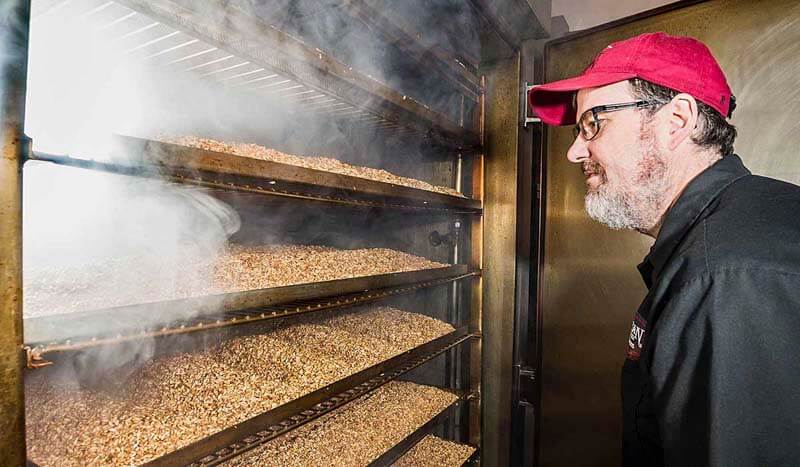
Again the name really says it all here. Maltsters use special processes to give these malts a certain edge. But be careful! For this reason special process or specialty malts tend to be pretty expensive.
Acidulated Malt
Dextrin-Style
Carapils® Copper Malt
Description: This is a very unique dextrin-style malt that adds body, foam retention, and beer stability just like Carapils® Malt, but unlike Carapils® this malt adds flavor and aroma. This malt is devoid of enzymes and can be steeped in hot water or mashed. (Briess)
Origin: United States
Manufacturer: Briess
Type: Dextrin-Style
Color Range (SRM): 30
Flavor Notes: Malty, graham cracker, toasty
Beer Styles: Red alesCarapils® Malt
Description: This is a very unique dextrin-style malt that adds body, foam retention, and beer stability without influencing color or aroma. The non-fermentables in Carapils® Malt are advantageous in balancing body and flavor of dark-colored beers. It has the full glassiness of a caramel malt, is devoid of enzymes, and can be steeped in hot water or mashed. (Briess)
Origin: United States
Manufacturer: Briess
Type: Dextrin-Style
Color Range (SRM): 1.5
Flavor Notes: No added flavor
Beer Styles: Adds body and foam stability without influencing color or aromaDextra Pils®
Description: Dextra Pils® malt utilizes a unique process to gelatinize the starch within the kernel. This malt will contribute additional body and foam stability without influencing color or flavor. (Great Western Malting)
Origin: United States
Manufacturer: Great Western Malting
Type: Dextrin-Style
Color Range (SRM): 1.5
Flavor Notes: NA
Beer Styles: All beers that need additional body, mouthfeel, and foam stabilitySmoked Malt
Smoked Malt, Apple Wood
Description: This smoked malt is produced using apple wood. It is a unique, enzyme-active specialty malt that contributes an intense smoke, smooth, sweet, smoky flavor. (Briess)
Origin: United States
Manufacturer: Briess
Type: Specialty
Color Range (SRM): 6
Flavor Notes: Intense smoke flavor, smooth, sweet
Beer Styles: Scottish ales, Oktoberfest, stout, and porterSmoked Malt, Cherry Wood
Description: This smoked malt is produced using cherry wood. It is a unique, enzyme-active specialty malt with a blend of pronounced smoke and subtle fruity flavor with malty sweetness that is surprisingly smooth and clean. (Briess)
Origin: United States
Manufacturer: Briess
Type: Specialty
Color Range (SRM): 5
Flavor Notes: Pronounced smoke, subtle fruity, malty sweet, smooth, clean
Beer Styles: Scottish ales, Oktoberfest, stout, and porterSmoked Malt, Mesquite
Description: This smoked malt is produced using mesquite wood. It is a unique, enzyme-active specialty malt that contributes pronounced smoke and upfront earthy mesquite flavor with some sweetness and is surprisingly smooth. (Briess)
Origin: United States
Manufacturer: Briess
Type: Specialty
Color Range (SRM): 5
Flavor Notes: Pronounced smoke, upfront smoky mesquite, slightly sweet, smooth
Beer Styles: Scottish ale, Oktoberfest, stout, and porterNon-Barley Malts
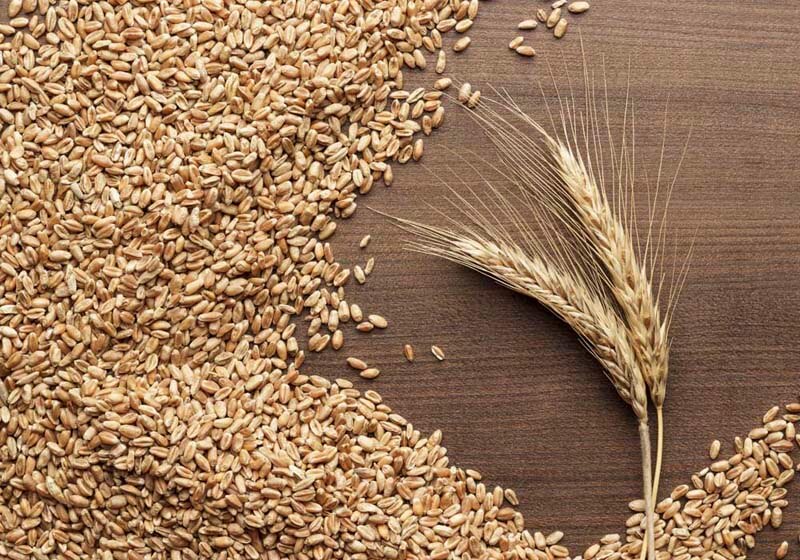
There are plenty of grains out there other than barley that are perfect for beer along with various ways to process them. We’ll do our best to outline the different types and some examples here.
Wheat Malt
Brewers Torrified Wheat
Description: The torrified wheat has been heat-treated to break the cellular structure, allowing more rapid hydration and malt enzymes to more completely attack the starches and protein. They can be used in place of raw wheat when making Belgian-style white and wit beers. Advantages over raw wheat include normal conversion time and higher yield. To decrease lautering time, include a small amount of rice hulls. (Briess)
Origin: United States
Manufacturer: Briess
Type: Specialty
Color Range (SRM): 1.5
Flavor Notes: Slightly nutty
Beer Styles: Belgian-style white and wit beersBrewers Red Wheat Flakes
Description: These wheat flakes are great in the production of Belgian wit beers and increase foam stability. They have a large surface area and are pre-cooked, so they hydrate and disintegrate quickly. (Briess)
Origin: United States
Manufacturer: Briess
Type: Specialty
Color Range (SRM): 2
Flavor Notes: Slightly nutty
Beer Styles: Belgian wit, wheat-style beersCaracrystal® Wheat Malt 55L
Description: This wheat malt is recommended for all beer styles that use caramel malts such as IPAs, pale ales, low-alcohol beers, wheat beers, bock beers, and session beers where a touch of subtle caramel plus smooth dark toast flavor is beneficial. (Briess)
Origin: United States
Manufacturer: Briess
Type: Specialty
Color Range (SRM): 55
Flavor Notes: Sweet, smooth, malty, bready, subtle caramel, dark toast, exceptionally clean finish
Beer Styles: You can use in any beer style to add sweetness and develop smooth or complex flavors; this malt also works great for improved body, foam and foam retention, flavor, and colorRahr Red Wheat
Description: Rahr Red Wheat is a pale wheat malt made from North American hard spring red wheat. Pale wheat malt has the sweet malty flavor of other malted grains, but with a hint of fruitiness. Wheat malts are high in protein, which helps produce fuller-bodied beers. Wheat malt can improve head formation and retention, depending upon the other grist constituents. Red wheat has a slight tartness to its flavor not present in white wheat. It also has smaller, harder kernels than white wheat, which can require careful milling. Rahr Red Wheat is suitable for all wheat-style beers. (Rahr)
Origin: United States
Manufacturer: Rahr
Type: Specialty
Color Range (SRM): 3-3.5
Flavor Notes: Slight tartness
Beer Styles: Wheat-style beersRahr Unmalted Wheat
Description: Rahr Unmalted Wheat is a raw wheat grain. Unmalted Wheat has a strong grain flavor and a very light straw color. It is used in many traditional Belgian styles to add flavor and cloudiness and improve head formation. The starch in raw grain is not gelatinized and the protein content is high. Depending upon use, a cereal mash and/or protein rest may be required. (Rahr)
Origin: United States
Manufacturer: Rahr
Type: Specialty
Color Range (SRM): 1.5-4
Flavor Notes: Strong
Beer Styles: Traditional Belgian stylesRahr White Wheat
Description: Rahr White Wheat is a pale wheat malt made from North American soft winter white wheat. Pale wheat malt has the sweet malty flavor of other malted grains, but with a hint of fruitiness. Wheat malts are high in protein, which helps produce fuller-bodied beers. Wheat malt can improve head formation and retention, depending upon the other grist constituents. White wheat is easier to mill than red wheat and more conducive to the haze characteristic of Belgian white beers. Rahr White Wheat is suitable for all wheat-style beers. (Rahr)
Origin: United States
Manufacturer: Rahr
Type: Specialty
Color Range (SRM): 3-3.5
Flavor Notes: Sweet, malty, hint of fruitiness
Beer Styles: Wheat-style beers, Belgian whiteWheat Malt
Description: Gambrinus plump, malted soft white wheat is of low protein. At an inclusion rate of up to 10%, Gambrinus Wheat Malt can be an additional source for body and head retention with minimal flavor contribution in any formulation. (Gambrinus)
Origin: Canada
Manufacturer: Gambrinus
Type: Speciality / Adjunct
Color Range (SRM): 1.8-2.8
Flavor Notes: Bread, dough, baked goods
Beer Styles: American wheat, blonde ale, hefeweizen, witbierWheat Malt, Red
Description: This malt is often used in hefeweizen and other traditional wheat styles due to a distinctive, characteristic wheat flour flavor. It runs efficiently through the brewhouse even with slightly higher protein than White Wheat Malt. You can use this malt as a part or all of your base malt in wheat beers. (Briess)
Origin: United States
Manufacturer: Briess
Type: Specialty
Color Range (SRM): 3
Flavor Notes: Creamy, sweet, malty, wheat flour
Beer Styles: Improves head retention in any style, typically used in kölsch, hefeweizen, and wheat beers; use with raw wheat or wheat flakes in traditional Belgian witWheat Malt, White
Description: This wheat malt contributes a light straw color and can be used as part or all of your base malt in wheat beers. (Briess)
Origin: United States
Manufacturer: Briess
Type: Specialty/Adjunct
Color Range (SRM): 2.8
Flavor Notes: Sweet, malty, wheat, mild breach dough
Beer Styles: Kölsch, American wheat, Belgian witWheat Unmalted
Description: Grown in the Pacific Northwest, Unmalted White Wheat is carefully cleaned and graded after harvest. This bag contains only the finest raw white wheat, excellent for body and retaining haze in your beer. (Great Western Malting)
Origin: United States
Manufacturer: Great Western Malting
Type: Specialty/Adjunct
Color Range (SRM): 1.5-4
Flavor Notes: Grainy
Beer Styles: All beers where residual haze is desired including NEIPA, hazy pale ale, Belgian wit, saison, German weizen, and weissbierWhite Wheat Malt
Description: Hearty enough to withstand a Pacific Northwest winter, White Wheat is steeped, germinated, and kilned to perfection. It’s the premium choice for American wheat beers. (Great Western Malting)
Origin: United States
Manufacturer: Great Western Malting
Type: Specialty/Adjunct
Color Range (SRM): 4
Flavor Notes: Sweet, malty, bready, soft
Beer Styles: Wheat beer such as kölsch, dunkelweizen, American hefeweizen, and wheatwineRye Malt
Biscuit Rye Malt
Description: Made with 100% malted rye, Biscuit Rye is roasted inside custom-designed drums in Vancouver, Washington. Biscuit Rye strikes a pleasant balance between toasted, biscuit-forward flavors and classic rye spice. A perfect choice for your next brewing or distilling creation. (Great Western Malting)
Origin: United States
Manufacturer: Great Western Malting
Type: Color
Color Range (SRM): 20
Flavor Notes: Biscuit-forward with mellow sweetness and gentle rye spice
Beer Styles: Pale ale, IPA, amber, porter, stout, or distilled spiritsBrewers Rye Flakes
Description: Use these rye flakes to contribute a very clean, distinctive rye flavor. They have a large surface area and are pre-cooked, so they hydrate and disintegrate quickly. They are made from choice rye that is guaranteed ergot-free. (Briess)
Origin: United States
Manufacturer: Briess
Type: Specialty
Color Range (SRM): 2
Flavor Notes: Distinctive ryeOat Malt
Texture is the name of the game here. Beers with oats have a very smooth, creamy mouthfeel.
Brewers Oat Flakes
Description: These oat flakes add a smooth, rich enjoyable texture to stouts and have a very distinctive “sticky” mouthfeel which is noticeable even when used in small amounts. They have a large surface area and are pre-cooked, so they hydrate and disintegrate quickly. (Briess)
Origin: United States
Manufacturer: Briess
Type: Specialty
Color Range (SRM): 2.5
Flavor Notes: Clean oaty
Beer Styles: Oatmeal stout, Belgian witOrganic Malts

Do your homework with organic malts. A very loose term, organic can sometimes be deceiving. Some organic malts do follow strict sustainable farming practices, but others not so much. Additionally, using an organic malt doesn’t necessarily make a better beer. If you’re using an organic malt to take a stand as a sustainable brewery, just make sure you work with a company that truly follows through on those processes.
Organic Bonlander® Munich Malt 10L
Description: This is an organic European-style Munich Malt with a clean, malty flavor. It works great for any beer that benefits from enhanced malty flavor. (Briess)
Origin: United States
Manufacturer: Briess
Type: Color
Color Range (SRM): 10
Flavor Notes: Clean, slightly sweet, rich malty
Beer Styles: Bock-style beers, those benefiting from enhanced malty flavorOrganic Brewers Malt
Description: A great organic base malt for all beer styles. It is produced exclusively from high-quality two-row North American malting barley grown in premium U.S. barley-growing regions. (Briess)
Origin: United States
Manufacturer: Briess
Type: Base
Color Range (SRM): 1.8
Flavor Notes: Clean, sweet mild malty
Beer Styles: Any beerOrganic Caramel Malt - 120L
Description: This is an organic drum-roasted crystallized malt that improves foam, enhances viscosity, and contributes golden hues with a dried fruit, candy-like sweetness. Briess Caramel Malts are roaster produced, making them the fullest-flavored and best-performing Caramel Malts. (Briess)
Origin: United States
Manufacturer: Briess
Type: Crystal
Color Range (SRM): 120
Flavor Notes: Pronounced caramel, burnt sugar, raisiny, prunes
Beer Styles: For balance in pilsners, in lagers ranging from Vienna and Oktoberfest to dark lagers, and in a variety of ales including pale ales, bitter IPAs, porter, stout, and barleywine, also doppelbockOrganic Caramel Malt - 20L
Description: This is an organic drum-roasted crystallized malt that improves foam, enhances viscosity, and contributes golden hues with a candy-like sweetness. Briess Caramel Malts are roaster produced, making them the fullest-flavored and best-performing Caramel Malts. (Briess)
Origin: United States
Manufacturer: Briess
Type: Crystal
Color Range (SRM): 20
Flavor Notes: Candy-like sweetness, mild caramel
Beer Styles: For balance in pilsners, lagers ranging from California common, Vienna, bock and dark lagers, and variety of ales including pale ales, bitter IPAs, porter, and stoutOrganic Caramel Malt - 60L
Description: This is an organic drum-roasted crystallized malt that improves foam, enhances viscosity, and contributes golden hues with a candy-like sweetness. Briess Caramel Malts are roaster produced, making them the fullest-flavored and best-performing Caramel Malts. (Briess)
Origin: United States
Manufacturer: Briess
Type: Crystal
Color Range (SRM): 60
Flavor Notes: Sweet, pronounced caramelt
Beer Styles: For balance in pilsners, in lagers ranging from Vienna and Oktoberfest to dark lagers, and in a variety of ales including pale ales, bitter IPAs, porter, stout, and barleywine, also doppelbockOrganic Chocolate Malt
Description: The chocolate flavor of this organic malt is complementary when used in higher percentages. It can be used in all beer styles for color adjustment. (Briess)
Origin: United States
Manufacturer: Briess
Type: Roasted Malt
Color Range (SRM): 500
Flavor Notes: Rich roasted coffee, cocoa
Beer Styles: Porter, stout, brown ale, dunkel, and other dark beersOrganic Munich 10L
Description: Seeking a well-balanced malty beer? This plump, sweet, and mellow Munich malt delivers impressions of toast, pretzel, toffee, and caramel, with nutty and cereal grain background notes. (BSG)
Origin: Canada
Manufacturer: Gambrinus
Type: Color
Color Range (SRM): 9.5-10.5
Flavor Notes: Toast, pretzel, toffee, caramel, nutty, cereal grain
Beer Styles: Ideal as the base malt for amber or red ales, Altbier, Scottish ales, and traditional Bavarian lagers; we also recommend small inclusions for pale ale, IPA, and other styles to intensify color and boost the perception of maltiness without the sweetness of caramel maltOrganic Pale Malt
Description: Gambrinus plump two-row European-style pale ale malt is an outstanding base for any craft beer. Processed from premium Canadian two-row barley. (BSG)
Origin: Canada
Manufacturer: Gambrinus
Type: Base
Color Range (SRM): 1.5-2
Flavor Notes: Honey, bready, fresh barley, grain, brown sugar, green tea, and graham cracker
Beer Styles: Use for styles where a rich malt flavor can be shown off, or where a strong malt backbone is needed to balance other strong flavors—IPA, pale ale, brown ale, golden ale, or Scottish and Belgian alesOrganic Pilsner Malt
Description: Processed from the finest Canadian two-row available, this very low-protein organic base malt is versatile in a wide range of organic beer styles. (BSG)
Origin: Canada
Manufacturer: Gambrinus
Type: Base
Color Range (SRM): 1.3-1.8
Flavor Notes: Expect delicate flavors of sugar cookie, grain, honey, and bread along with distinctive nutty character and suggestions of fresh barley
Beer Styles: Pilsner, kölsch, pale lager, Belgian ale, session IPA, blonde ale, hefeweizen, witbierOrganic Roasted Barley
Description: This organic malt provides color and rich, sharp flavor which is a characteristic in stouts and some porters. It may be used with black malt to brew a stout with more color and less intense roasted barley flavor notes. You can use chocolate malt or black malt in combination with roasted barley to obtain desired color. (Briess)
Origin: United States
Manufacturer: Briess
Type: Roasted
Color Range (SRM): 300
Flavor Notes: Coffee, intense bitter, dry
Beer Styles: Porter and stoutOrganic Wheat Malt
Description: Gambrinus plump, malted soft white wheat is of low protein. At an inclusion rate of up to 10%, Gambrinus Organic Wheat Malt can be an additional source for body and head retention with minimal flavor contribution in any formulation. (BSG)
Origin: Canada
Manufacturer: Gambrinus
Type: Speciality / Adjunct
Color Range (SRM): 1.8-2.8
Flavor Notes: Bread, dough, and baked goods
Beer Styles: American wheat, blonde ale, hefeweizen, witbierLooking for More Guides on Malts Around the World?
